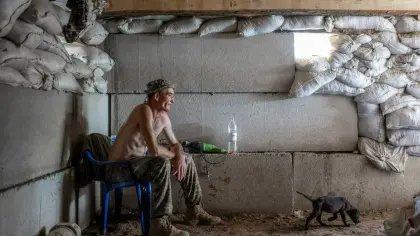On the front line south of the Ukrainian city of Mykolaiv, a 40-year-old combat medic nicknamed “Doc” is preparing to mark the six month anniversary of Russia’s invasion in a trench.
“You need to be prepared for the fact that this could last a long time,” said Doc, whose owlish eyebrows poke out from under his camouflage helmet.
JOIN US ON TELEGRAM
Follow our coverage of the war on the @Kyivpost_official.
“There are lots of tears, lots of blood. You cry in your heart,” said the medic — a dental technician in civilian life.
“The history of generations is being destroyed.”
In a subterranean bunker complex, surrounded by rusted tank traps and thronging with stray cats and dogs, his comrades spoon down piping hot bowls of hearty soup.
At the head of the table sits a man with an arm tattoo reading “never give up” in cursive script.
“Six months of war is not only a great grief for the country, it is also a small grief for each person personally,” said 41-year-old soldier Mykola, sitting to his left.
The battalion’s deputy commander Artem, 30, said: “We’ve informed our soldiers that the conflict could drag on for years.”
Russia launched its assault on February 24, attempting to seize the Ukrainian capital in a lightning offensive.
Kyiv’s forces put up stiff resistance, forcing a Russian retreat before the war shifted to the eastern Donbas region.
In recent weeks the focus has moved to southern Ukraine, where Ukrainian forces say they are preparing a counter-offensive.

EU Transfers €1.5 Bln Raised From Russian Assets for Ukraine
Asked during a visit to Odessa about hopes for the future, UN Secretary General Antonio Guterres closed his eyes, slowed his words, and spoke of a “very difficult situation, where the prospects for peace are not obvious”.
– A third front –
In Mykolaiv, the war now seems like nothing new.
Wartime billboards have been sodden in the winter, torn by the blusters of spring, and bleached in the savage summer heat.
Checkpoint sandbags have split their seams and sprouted weeds.
In the opening weeks of the war a Russian missile punched a hole in the regional government HQ, killing 37.
The gaping hole is now one of many scars in the port hub’s skyline as the city remains under incessant shelling.
The Petro Mohyla Black Sea State University was struck twice last week.
The front entrance was blown apart, ceiling panels torn down, and windows shattered into mosaic pieces of glass.
The facade’s collapse revealed classrooms within.
“They attack schools, hospitals, the port and the city’s infrastructure,” said rector Leonid Klymenko, inside a gutted study hall.
“It is clear that they want to completely destroy Ukraine’s education (system), destroy the Ukrainian spirit, destroy everything Ukrainian.”
– Path for peace? –
As the war approaches its seventh month, there are some scant signs of progress.
The UN and Turkey have brokered a landmark grain deal which is seeing Russia relax a blockade on Ukraine’s sourthern Black Sea ports, allowing grain shipments to sail and ease a global food price crisis.
On Friday, Guterres toured a port in the city of Odesa to hail the fresh pact.
But the visit was overshadowed by swirling concerns around the Zaporizhzhia nuclear power plant, elsewhere in Ukraine’s south, occupied by Russian troops and under fire by rockets.
“It will not be easy to find a path for peace in the short term,” Guterres told AFP.
“But we must persist because peace is the most important good in the world.”
You can also highlight the text and press Ctrl + Enter






